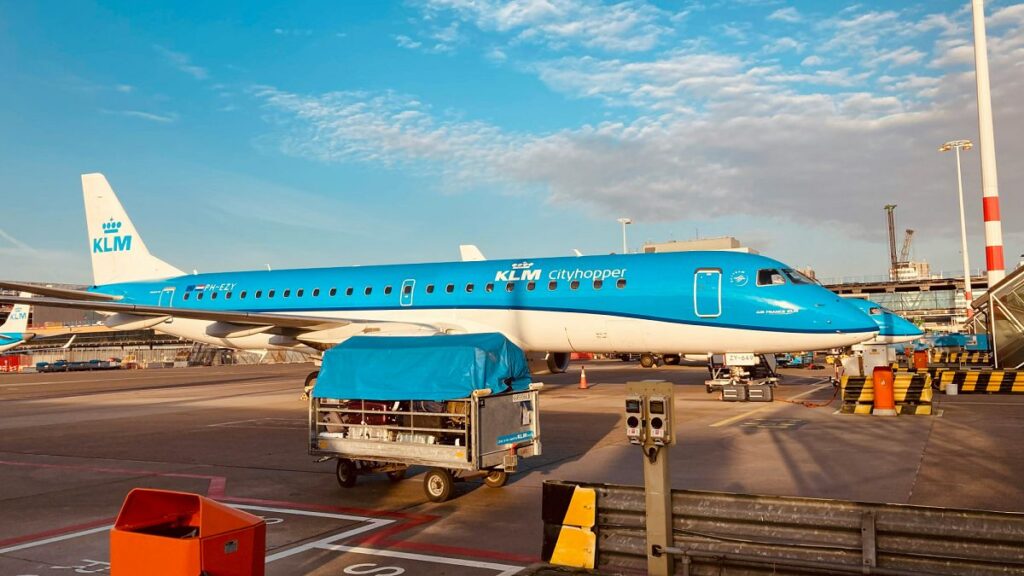The Dutch government is planning to raise taxes on airfares beginning in 2026.
Consumer groups and airlines have condemned the move, saying it will make flying unaffordable for many travellers.
Flight taxes in the Netherlands are already among the highest in Europe.
Aviation bodies also claim it will hinder efforts to make flying more sustainable.
Netherlands plans airfare hikes in 2026 and 2027
Beginning on 1 January 2026, the Dutch government intends to increase the air passenger tax by 2.9 per cent. The current rate of €29.40 will therefore rise to €30.25, according to calculations by the ANVR (Royal Dutch Airline Traffic Authority).
The outgoing government is also planning to hike the flight tax on long-haul routes by 2027. It is a move, it says, that will generate an extra €248 million in revenue.
For travellers, however, it could mean an increase of €50 to €70 per ticket or more, depending on the final proposal.
The government says it will use part of the revenue to make aviation more sustainable and reduce its environmental impact.
Airlines and consumer groups condemn new flight tax
Various airline, airport and consumer bodies have warned that the additional tax will devastate the aviation sector in the Netherlands.
They say it will weaken the country’s role as a travel hub, undermine connectivity and inconvenience passengers.
It will also hinder investments into aviation decarbonisation, they say.
“Raising aviation taxes is the textbook example of short‑term political thinking. Ticket taxes harm the benefits that airports provide for citizens and national economies,” said Olivier Jankovec, director general of Airports Council International (ACI) Europe.
“Crucially, taxing aviation diverts resources away from the massive investments required to achieve net‑zero. What we need is government support to accelerate this transition, not policies that weaken the sector and penalise consumers.”
Ourania Georgoutsakou, managing director of Airlines for Europe (A4E), added that, “Time and time again, these unjustified tax rises have been shown to serve neither the passenger nor the climate.
“It simply makes the Netherlands less attractive as a place for business and tourism. Passengers continue to travel, but to another destination.”
Tax forces Dutch fliers to choose foreign airports
Flight tax hikes are forcing travellers to cross the border into neighbouring countries for more affordable airfares, according to Dutch carrier KLM.
The airline says its research found that 74 per cent of Dutch people who fly will consider departing from Belgium or Germany more often if the price of airline tickets rises further due to the new tax.
“This flight tax makes the Netherlands the most expensive country in the European Union for air travel, no matter the distance. As a result, even more Dutch travellers are choosing to drive across the border to fly from airports in neighbouring countries,” says Marjan Rintel, CEO of KLM.
“This doesn’t help the climate – in fact, it actually undermines our ability to continue investing in cleaner and quieter aviation. The Netherlands is pricing itself out of the market. This puts pressure on our airline network and strikes at the heart of the Netherlands’ global connectivity.”
If a flight tax on long-haul routes is introduced in 2027, the price difference between departing from the Netherlands or another country will be even more marked.
A family with two children already pays €120 in flight tax per trip, according to KLM. In Belgium, the maximum flight tax per ticket is €10, Sweden is abolishing its flight tax, and Germany is even considering reversing its recent increase.
Soon, however, a Dutch family of four will pay €200 in tax on a flight to Greece or Turkey.
“We see that passengers want to keep flying, but they are very price-sensitive. Since the introduction of the flight tax in 2021, the share of Dutch travellers flying from Düsseldorf and Brussels has already increased by 41 per cent and 20 per cent, respectively, between 2019 and 2024,” says Rintel.
“Further increases in ticket prices – whether due to higher flight taxes or increased airport fees – will only accelerate the shift of travellers to airports abroad.”
Read the full article here







